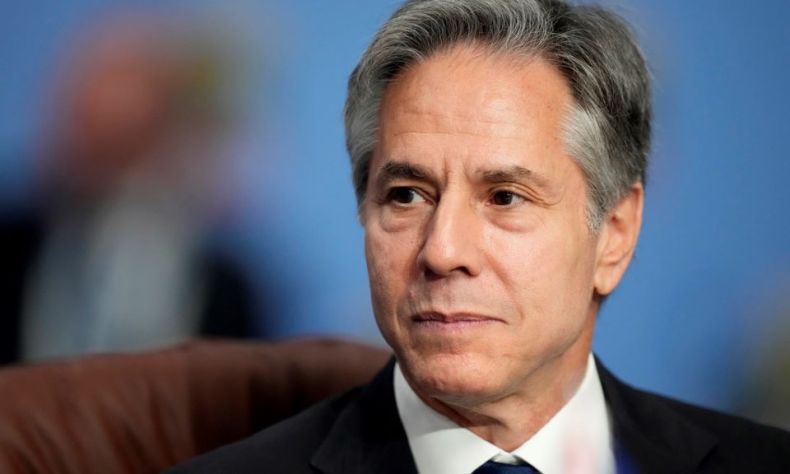
U.S. Secretary of State Antony Blinken arrived in Seoul late Sunday evening, initiating a high-stakes diplomatic mission aimed at navigating the political turmoil engulfing South Korea. His visit underscores the Biden administration’s commitment to maintaining robust alliances in the Asia-Pacific region, even as South Korea grapples with internal political instability following the impeachment and suspension of President Yoon Suk Yeol.
On Monday, Blinken is scheduled to meet with his South Korean counterpart, Cho Tae-yul, just as a critical deadline approaches: the expiration of a warrant for the arrest of President Yoon Suk Yeol. Yoon, who attempted to declare martial law on December 3 in response to growing civil unrest, faces significant legal and political challenges that have left South Korea in a precarious state.
The Secretary of State’s visit comes at a pivotal moment as he seeks to delicately endorse continuity in South Korea’s foreign policy while steering clear of the domestic political fray. Yoon’s abrupt and controversial attempt to impose martial law led to widespread protests and his subsequent suspension, leaving South Korea’s democratic institutions under intense scrutiny.
Blinken’s trip to Seoul marks the beginning of what is likely to be his final overseas mission in his current role. This visit serves as a testament to President Joe Biden’s foreign policy legacy, highlighting efforts to strengthen alliances with democratic nations. Blinken’s subsequent stop in Tokyo underscores the importance of maintaining a delicate balance between South Korea and Japan, two critical U.S. allies with a historically strained relationship.
The Secretary of State’s advisors have emphasized the necessity of avoiding any perception of favoritism towards Japan over South Korea, particularly as both nations play crucial roles in regional security and house significant numbers of U.S. troops. By visiting Seoul first, Blinken aims to reaffirm the United States’ commitment to South Korea during this turbulent period.
Yoon Suk Yeol was once seen as a vital partner for the Biden administration. His leadership had been marked by bold initiatives to repair South Korea’s relationship with Japan and to elevate its role in global affairs. His participation in a landmark trilateral summit with Japan’s Prime Minister and President Biden, and his leadership role in a global democracy summit, positioned him as a key figure in Biden’s strategy for reinforcing democratic alliances.
Yoon’s charm was on full display during a state visit to the United States, where he famously sang “American Pie” at a White House dinner, endearing himself to his American hosts. However, his domestic political missteps and the ensuing crisis have overshadowed his earlier achievements.
Blinken is expected to face criticism from South Korea’s left-wing factions during his visit. Despite this, analysts believe he can effectively navigate the political landscape, focusing on broader regional challenges such as North Korea and China. Sydney Seiler, a former U.S. intelligence officer specializing in Korean affairs, notes that Blinken’s high profile and diplomatic acumen position him to rise above South Korea’s domestic political tensions.
“Blinken can dodge a lot of these domestic South Korean landmines relatively easily and contextualize it not as trying to help the ruling party or artificially create a sense of normalcy where it otherwise isn’t,” Seiler said.
The State Department has refrained from commenting directly on South Korea’s political crisis. Instead, it has emphasized the importance of continuing trilateral cooperation with Japan, particularly in intelligence sharing related to North Korea. Blinken’s visit is intended to ensure that this cooperation remains intact despite the political upheaval.
The situation in South Korea also holds implications for the upcoming transition of power in the United States. With Donald Trump set to return to the White House on January 20, the Biden administration is working to solidify its foreign policy achievements. Trump’s prior warm relationship with former progressive South Korean President Moon Jae-in, who facilitated Trump’s historic diplomacy with North Korea, contrasts sharply with Biden’s engagement with the conservative Yoon.
The Biden administration has underscored its commitment to engaging with South Korean politicians across the political spectrum. This outreach is crucial as uncertainties loom over who will steer Asia’s fourth-largest economy moving forward.
Progressive opposition leader Lee Jae-myung, who is himself embroiled in a court case that could disqualify him from future elections, supports diplomatic engagement with North Korea. However, his views diverge from both Biden and Trump on key issues, including the deployment of U.S.-made THAAD missile defenses, which Lee has criticized as provocative to China.
South Korea’s left has long maintained a harder stance toward Japan, rooted in historical grievances stemming from Japan’s colonial occupation of Korea from 1910 to 1945. This legacy continues to shape South Korea’s foreign policy and complicates U.S. efforts to foster closer trilateral cooperation.
The imposition of martial law by Yoon caught U.S. officials by surprise, triggering massive protests and further complicating the political landscape. Blinken, speaking to reporters last month, highlighted the resilience of South Korea’s democratic institutions in the face of the crisis.
“I think Korea is one of the most powerful stories in the world about the emergence of democracy and democratic resilience, and we’ll continue to look to Korea to set that example,” Blinken said.






